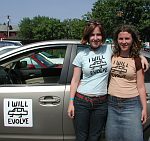|
By accessing or using The Crittenden Automotive Library™/CarsAndRacingStuff.com, you signify your agreement with the Terms of Use on our Legal Information page. Our Privacy Policy is also available there. |

Sierra Club Enlists Students to Promote Hybrid Vehicles
|
|---|
|
|
Sierra Club Enlists Students to Promote Hybrid Vehicles
Jeremy White
July 1, 2004
 Listen to Sierra Club Enlists Students to Promote Hybrid Vehicles - RealPlayer - 604KB - 4:54
Listen to Sierra Club Enlists Students to Promote Hybrid Vehicles - RealPlayer - 604KB - 4:54

Rebecca Van Damm

Rebecca Van Damm and Stephanie Powell
|
The Bush administration's energy initiatives, especially its call for oil drilling in the Alaskan wilderness and its concessions to fossil fuel industries, are a source of concern to many environmentalists. They believe the Administration is more interested in supporting the oil companies than in seeking alternative forms of energy. To publicize those alternatives, the Sierra Club, long a bulwark of environmental protection, is hitting the road to demonstrate a hot new type of car that goes easy on the environment and a very long way on a tank of gas. Jeremy White tells us more.
While many college students spend their vacation picking up some extra cash as camp counselors or lifeguards, Rebecca Van Damm and Stephanie Powell are driving a car this summer, but not just any car. It is a gas-electric hybrid, and they are driving it along the east coast from Key West, Florida to the Canadian border. Rebecca, who is studying Environmental Ethics at the University of Georgia, says the trip promotes a cause she and Stephanie believe in.
"We're both pretty environmentally active and aware," says Rebecca Van Damm. "Stephanie has headed up the Students for Environmental Awareness at our school, and also teaches environmental issues to children at the Boys and Girls club of Athens, and she also wanted to help spread the word about clean energy."
Their Toyota Prius is one of three hybrids the Sierra Club is sponsoring in its campaign to promote awareness of renewable energy. A second car is traversing the country via Route 66, while the third is rolling up the West Coast.
Since the first hybrid car came onto the U.S. market in December 1999, public interest has been steadily rising, right along with gas prices. Today, there are three models from Toyota and Honda and demand is so high that there is a waiting list of up to a year and a half to purchase one. U.S. carmakers GM and Ford are also getting into this growing market with the first hybrid SUVs, and Lexus is designing the first luxury hybrid car.
The trend does not surprise Rebecca Van Damm, who has nothing but good things to say about her car's capabilities.
"It's wonderful. It's a breeze," she adds. "It has 104 horsepower, it has great pickup, it's lightweight, aerodynamic, and it goes as fast as any other car, handles the road beautifully, turns on a dime; I really have no complaints and neither do test drivers."
Environmentalists say that hybrid car technology is a useful and necessary means of moving beyond America's current dependence on petroleum. Stephanie Powell says that idea is underscored by the tour's slogan: "I Will Evolve."
"The idea of evolution is that to evolve is to get better and that means making better choices. And we're here to say there are better choices out there," says Ms. Powell. "The Bush administration is pursuing dirty energy policies that are harming our coasts, contributing to global warming and are not being cost-effective in our pocketbooks with the rising gas prices. Moving away from oil dependency can definitely help people out. So we're here to show that we can evolve beyond oil dependence into cars that can take us further for our dollar and protect our environment and our health."
To speed that evolution, Stephanie Powell joins other environmentalists in calling for the Bush Administration to shift funding from fossil fuels to renewable energies.
But that's not the answer, according to Jerry Taylor, director of natural resource studies at the Cato Institute. He says that the success of an industry depends upon its natural potential, not the amount of government support it receives.
"I don't think the government has any business promoting renewable energy or discouraging renewable energy," he notes. "I think decisions about whether to use this, that or the other to make renewable energy in this economy are best made by investors and not by government. If renewable energy has economic merit we won't need to subsidize it. If renewable energy lacks economic merit, then no amount of subsidy is going to give it merit. Government support isn't like magic dust that you sprinkle over technology and all of a sudden it becomes effective and worthwhile. If a technology is worthwhile then we don't need to help it. If it isn't, then no amount of government help will make it worthwhile."
However the government decides to treat renewable energies, the technology is generating interest among investors and consumers. Stephanie Powell says that since she first started her tour a month ago, she has seen how people's minds can be changed when they actually see the car.
"We were at Cape Hatteras State Park in North Carolina, and we spoke with a family of four, the woman actually worked at a gas station, and they were very interested, very receptive," she recalls. "The thing that was really neat and really showed for me that this really can catapult, after talking to them, they put a bumper sticker on the back of their baby carriage. And so we watched this family walk away with this 'I Will Evolve' bumper sticker on the baby carriage. It's like investing in future generations and seeing that this technology will take us further, and might take that baby further. And that was really neat for me."
Sierra Club members and other environmentalists say continued demand for hybrid cars, coupled with a decrease in government subsidies for fossil fuel industries, could lead soon to a U.S. automobile market dominated by alternative energy vehicles.


















 Listen to Sierra Club Enlists Students to Promote Hybrid Vehicles - RealPlayer - 604KB - 4:54
Listen to Sierra Club Enlists Students to Promote Hybrid Vehicles - RealPlayer - 604KB - 4:54


